外研版七年级下册一般将来时共16页文档
Module 4 Unit 3 Language in use 一般将来时will 课件(外研版七年级下册)
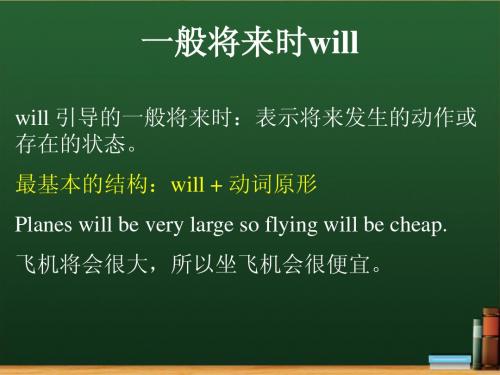
(2)表示将来某一段时间内经常的动作或状态: The students will come and work in the lab once a week. We will come and work in this factory every year.
一般将来时will
2. There be句型的一般将来时 肯定句: There will be +名词+其他成份 无论后面加单数名词或复数形式,be必须用原形。 There will be only one country. There will be many workers in this city.
否定句:在will后面加not There won’t be only one country.
一般疑问句:把will提到there之前 Will there be only one country? Yes, there will. / No, there won’t.
一般将来时will
3. 用法 (1)表示将来某一时刻的动作或状态: We will come to see you the day after tomorrow. There will be a wonderful show next :在will后面加not(will not可缩写为 won’t) They will not (won’t) use books. 一般疑问句:will提到句子主语前,结尾变问号 Will students go to school in the future? 特殊疑问句:特殊疑问词+will+主语+V.原形+其他 What will your dream school have?
外研版英语七年级下册:Module 4 Unit 3 Language in use. 一般将来时
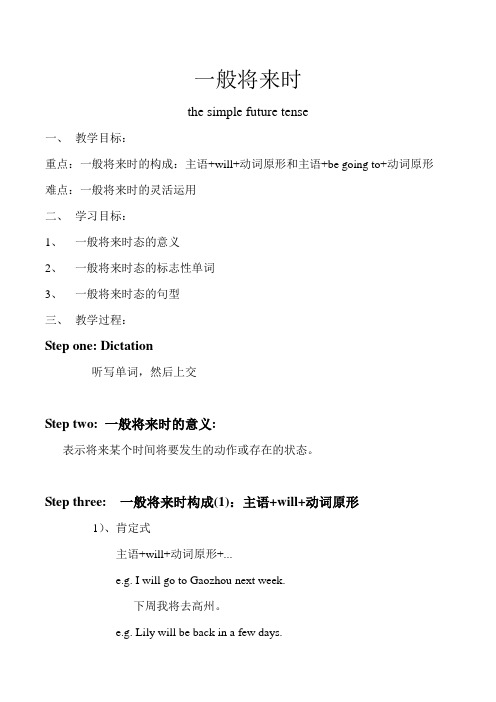
一般将来时the simple future tense一、教学目标:重点:一般将来时的构成:主语+will+动词原形和主语+be going to+动词原形难点:一般将来时的灵活运用二、学习目标:1、一般将来时态的意义2、一般将来时态的标志性单词3、一般将来时态的句型三、教学过程:Step one: Dictation听写单词,然后上交Step two: 一般将来时的意义:表示将来某个时间将要发生的动作或存在的状态。
Step three: 一般将来时构成(1):主语+will+动词原形1)、肯定式主语+will+动词原形+...e.g. I will go to Gaozhou next week.下周我将去高州。
e.g. Lily will be back in a few days.丽丽几天后将回来。
2)、否定式主语+will+not+动词原形+...e.g. I will not go to Gaozhou next week.下周我将不会去高州。
e.g. Lily won’t be back in a few days.丽丽几天后还不会回来。
3)、一般疑问式Will+主语+动词原形+...?A: Will you go to Beijing next week?B: Yes, I will.B: No, I won’t.A: Will Lily be back in a few days?B: Yes, she will.B: No, she won’t.Step four: 常与一般将来时连用的时间状语下次next time明天tomorrow明年next year今天下午this afternoon后天the day after tomorrow不久后a moment later将来in the future明天早上tomorrow morning一小时后In an hourStep five: 一般将来时构成(2):主语+be going to+动词原形1)、表示现在的意图,即打算在最近或不久的将来做某事。
七下英语作文范文外研版一般将来时
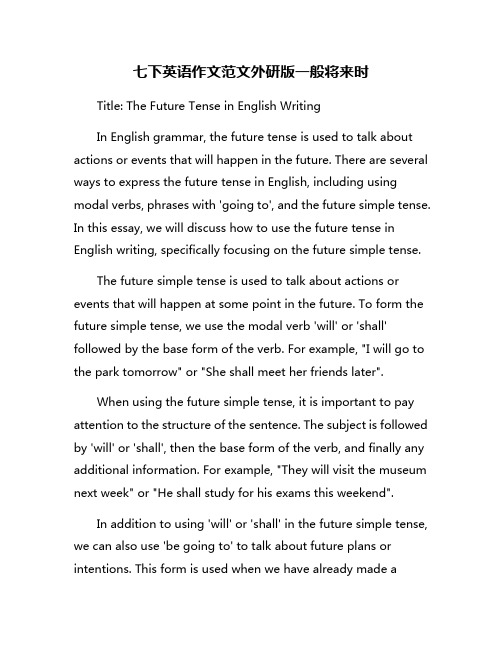
七下英语作文范文外研版一般将来时Title: The Future Tense in English WritingIn English grammar, the future tense is used to talk about actions or events that will happen in the future. There are several ways to express the future tense in English, including using modal verbs, phrases with 'going to', and the future simple tense. In this essay, we will discuss how to use the future tense in English writing, specifically focusing on the future simple tense.The future simple tense is used to talk about actions or events that will happen at some point in the future. To form the future simple tense, we use the modal verb 'will' or 'shall' followed by the base form of the verb. For example, "I will go to the park tomorrow" or "She shall meet her friends later".When using the future simple tense, it is important to pay attention to the structure of the sentence. The subject is followed by 'will' or 'shall', then the base form of the verb, and finally any additional information. For example, "They will visit the museum next week" or "He shall study for his exams this weekend".In addition to using 'will' or 'shall' in the future simple tense, we can also use 'be going to' to talk about future plans or intentions. This form is used when we have already made adecision or have a specific intention to do something in the future. For example, "I am going to start a new job next month" or "They are going to travel to Europe next summer".Overall, the future simple tense is a common and important aspect of English writing. By understanding how to use this tense correctly, we can effectively communicate about future actions and events. Practice using the future simple tense in your writing, and you will soon become more confident in expressing future plans and intentions.。
外研版七年级下学期M3-Making-plans---be-going-to-专讲

What are you going to do tomorrow? 你准备明天做什么?
What are you going to do today? 今天你们打算做什么?
be going to的用法
2. 有迹象要发生的事 It’s going to be a fine day tomorrow. 明天将会是个好天。 Look at the sky, it is going to rain. 看天空,要下雨了。 I think it’s going to snow. 我看快要下雪了。 I’m not well today. I am afraid I am going to have a cold. 我今天不舒服,恐怕我要感冒了。 Look at the dark clouds, there is going to be a storm. 看看这些黑云,将有一场暴风雨。
I’m going to play the violin. 我打算拉小提琴。
She’s going to play the piano. 她打算弹钢琴。
be going to的用法
The plced next month. 这部戏下个月将会制作好。
What are you going to give the teacher for
1. 问人 Who…? I’m going to New York soon. → Who’s going to New York soon? 2. 问干什么 What … do? My father is going to watch a race with me this afternoon. →What is your father going to do with you this afternoon? 3. 问什么时候 When…? She’s going to go to bed at nine. →When is she going to bed?
外研版七年级下册MODULE34专项语法一般将来时

一般将来时讲解及练习题一、构成由“助动词will + 动词原形”构成,当主语是第一人称时,也可以用“助动词shall +动词原形”。
will 在名词或代词后常缩写为'll,will not缩写为won’t;shall一般不缩写,shall not缩写为shan’t。
例如:He will help his sister with her lessons.他将帮助他妹妹做功课。
We shall/will not be free this afternoon.今天下午我们没空。
一般将来时表示在将来的某个时候将要发生的动作或存在的状态,常与tomorrow, next year, in a minute等时间状语连用。
二、用法:一般将来时表示将要发生的动作或存在的状态以及计划、打算做某事。
例句:They will have a football match tomorrow.He will be thirty next week.She is going to buy a coat this afternoon.1.其结构有如下几种:1)will + 动词原形(will可以用于任何人称) shall+ 动词原形需要注意的是当主语是第一人称时will可以换成shall,特别是在以I或we作主语的问句中,一般用shall. 如:. Shall we go to the zoo?2)be going to +动词原形3)表示位置移动的词如come, go , leave, fly 等用现在进行时也可表示将来,2.变否定句:1)在will后边加not. 变一般疑问句把will提前. 例如:She will be back in three days.She will not be back in three days.Will She be back in three days?2)在be后边加not.。
外研版七年级英语下册:一般将来时复习

Many girls like ______ a pet. 4. There will be a spokretsepminegeting tomorrow.(一般疑问句)
___ ___ ___ a sports meeting tomorrow?
5. W我i想ll 将the会re有be更多高楼,更少汽车,更少污染。
3.Everyone will have a computer in the future. 4.Meimei is cooking,she will take the food to the party this
evening.
5.My dream school will have big classrooms and libraries.
6.Students will talk to their teachers on the computers.
7.Will there be schools in the future?
No, there won`t.
8.We will use the Internet to study at home.
C.would
D.is going to
注意:will与be going to的区别,be going to可以表示明显将要发生的情况.
3.There__ a basketball match this afternoon.
B
A.will have B.will be
C.has
D.have
4. We__ to the park if it is fine tomorrow. A
第五页,共16页。
例句:
七下外研版M4Life in the future wil一般将来时专讲 专讲

一般将来时 will 的用法
will主要用在以下几个方面: 1. 某人将要去做的事情,大致相当于be going to。
He will write a book one day. She will do her homework. We will win. They will do heavy work. I will visit Shanghai.
Will变一般疑问句要点: will提到句首, some变any, and 改为or,第一二人称互换。
will将来时一般疑问句练习
将下列句子改为一般疑问句。
1.I will fly in the sky one day. Will you fly in the sky one day ? 2.We will go to school by plane. Will you go to school by plane ? 3.She will buy some apples. Will she buy any apples? 4.I will borrow some interesting fictions. Will you borrow any interesting fictions? 5.Students will travel by plane and rocket. Will students travel by pane or rocket ? 6.Students will use pens, paper and erasers to do their homework. Will students use pens, paper or erasers to do their homework?
Will句型结构
will特殊疑问句: 特殊疑问词+will+主语+do +其他?
(完整版)外研版年七年级下册MODULE3-4专项语法--一般将来时
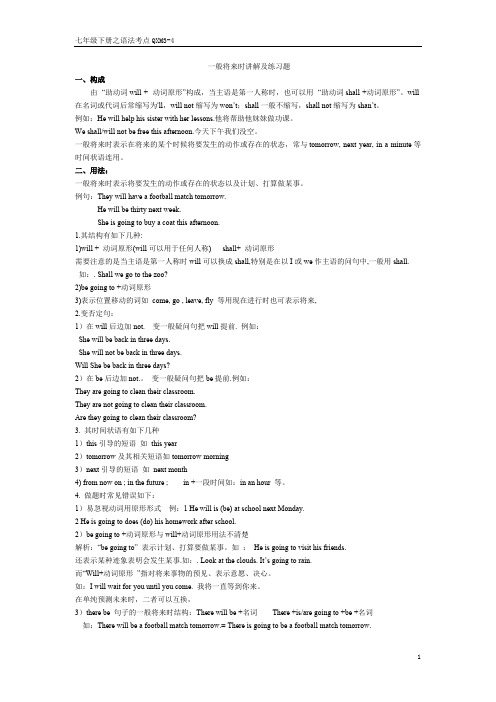
一般将来时讲解及练习题一、构成由“助动词will + 动词原形”构成,当主语是第一人称时,也可以用“助动词shall +动词原形”。
will 在名词或代词后常缩写为'll,will not缩写为won’t;shall一般不缩写,shall not缩写为shan’t。
例如:He will help his sister with her lessons.他将帮助他妹妹做功课。
We shall/will not be free this afternoon.今天下午我们没空。
一般将来时表示在将来的某个时候将要发生的动作或存在的状态,常与tomorrow, next year, in a minute等时间状语连用。
二、用法:一般将来时表示将要发生的动作或存在的状态以及计划、打算做某事。
例句:They will have a football match tomorrow.He will be thirty next week.She is going to buy a coat this afternoon.1.其结构有如下几种:1)will + 动词原形(will可以用于任何人称) shall+ 动词原形需要注意的是当主语是第一人称时will可以换成shall,特别是在以I或we作主语的问句中,一般用shall.如:. Shall we go to the zoo?2)be going to +动词原形3)表示位置移动的词如come, go , leave, fly 等用现在进行时也可表示将来,2.变否定句:1)在will后边加not. 变一般疑问句把will提前. 例如:She will be back in three days.She will not be back in three days.Will She be back in three days?2)在be后边加not.。
外研版七年级下册时态之一般将来时(26张)

Yes,she will.
否定回答 No, 主语 + won't.
No,she willn't.
Part 2 特殊考点
一般将来时的特殊考点
1.will 和 be going to 的区别
be going to 计划
She is going to lend us her books.
可能性大 时间性短
Part 3 总结
定义
表示将来某一时间将发生的动作或状态
动词形式
am/is/are+going to do will do
一
般
时间词
tomorrow,next ....,this morning/afternoon/.....
将
tonight,in the future,in + 一段时间 ,soon
A.move
B .moved
C.will move
D .are moving
( )6. _____you ____a doctor when you grow up?
A.Will; going to be
B.Are; going to be
C.Are; /
D.Will; be
( )7.He will be back _____a few minutes.
2.现在进行时表将来
The bus is coming.
公交车快来了。
The plane is leaving.
飞机将要离开。
3.There be 句型的将来时
There is going to be a football match next week. =There will be a football match next week.
外研版英语七年级下册:Module 4 Unit 3 Language in use. 一般将来时态
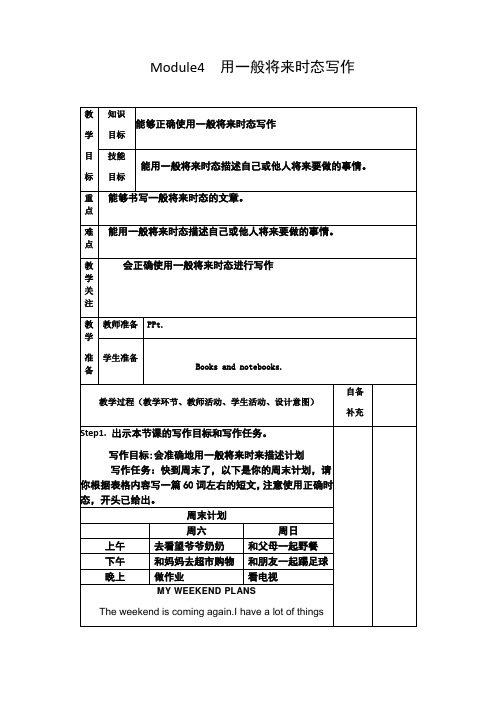
Step12.Homework:暑假将至,同学们就自己暑假生活安排进行了交流。请你用英语向美籍教师Mr Brown介绍有关情况以及自己的暑期计划。词数60-80左右。
内容应包括以下要点:
1.有的同学打算去探访一些名胜古迹(places of interest)。
2.有的同学计划在家中多读书,为将来的学习做准备。
课后反思
围绕本课达成目标、教学方式、学习方式、课程资源的开发与利用等进行反思
1.学生单词不够熟悉,词组搭配错误,应强调学生多记忆。
2.学生英语写作出现汉语式思维,应多训练简单句的五种基本句式。
教学过程(教学环节、教师活动、学生活动、设计意图)
Байду номын сангаас自备
补充
Step1.出示本节课的写作目标和写作任务。
写作目标:会准确地用一般将来时来描述计划
写作任务:快到周末了,以下是你的周末计划,请你根据表格内容写一篇60词左右的短文,注意使用正确时态,开头已给出。
周末计划
周六
周日
上午
去看望爷爷奶奶
和父母一起野餐
Module4用一般将来时态写作
教
学
目
标
知识
目标
能够正确使用一般将来时态写作
技能
目标
能用一般将来时态描述自己或他人将来要做的事情。
重点
能够书写一般将来时态的文章。
难点
能用一般将来时态描述自己或他人将来要做的事情。
教学关注
会正确使用一般将来时态进行写作
教学
准备
教师准备
PPt.
学生准备
Books and notebooks.
Step4.添加主语、谓语动词的正确形式和其他成份,连词成句。
新版外研社七年级一般将来时
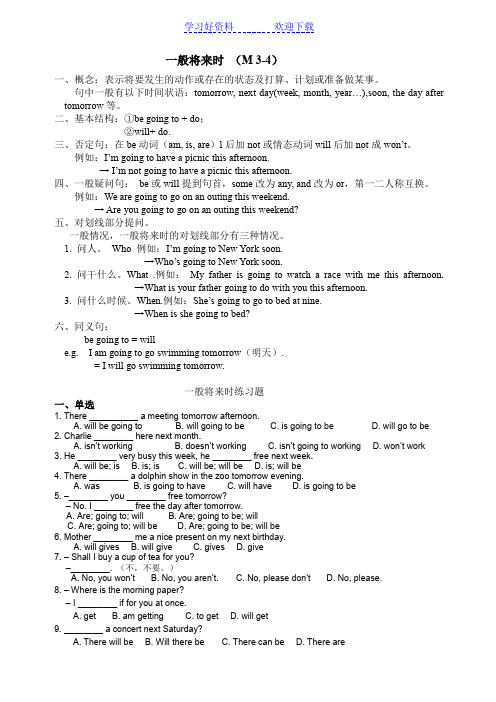
一般将来时(M 3-4)一、概念:表示将要发生的动作或存在的状态及打算、计划或准备做某事。
句中一般有以下时间状语:tomorrow, next day(week, month, year…),soon, the day after tomorrow等。
二、基本结构:①be going to + do;②will+ do.三、否定句:在be动词(am, is, are)l后加not或情态动词will后加not成won’t。
例如:I’m going to have a picnic this afternoon.→ I’m not going to have a picnic this afternoon.四、一般疑问句:be或will提到句首,some改为any, and改为or,第一二人称互换。
例如:We are going to go on an outing this weekend.→ Are you going to go on an outing this weekend?五、对划线部分提问。
一般情况,一般将来时的对划线部分有三种情况。
1. 问人。
Who 例如:I’m going to New York soon.→Who’s going to New York soon.2. 问干什么。
What .例如:My father is going to watch a race with me this afternoon.→What is your father going to do with you this afternoon.3. 问什么时候。
When.例如:She’s going to go to bed at nine.→When is she going to bed?六、同义句:be going to = wille.g. I am going to go swimming tomorrow(明天).= I will go swimming tomorrow.一般将来时练习题一、单选1. There __________ a meeting tomorrow afternoon.A. will be going toB. will going to beC. is going to beD. will go to be2. Charlie ________ here next month.A. isn’t workingB. doesn’t workingC. isn’t going to workingD. won’t work3. He ________ very busy this week, he ________ free next week.A. will be; isB. is; isC. will be; will beD. is; will be4. There ________ a dolphin show in the zoo tomorrow evening.A. wasB. is going to haveC. will haveD. is going to be5. –________ you ________ free tomorrow?– No. I ________ free the day after tomorrow.A. Are; going to; willB. Are; going to be; willC. Are; going to; will beD. Are; going to be; will be6. Mother ________ me a nice present on my next birthday.A. will givesB. will giveC. givesD. give7. – Shall I buy a cup of tea for you?–________. (不,不要。
外研版英语初一年级英语英语一般将来时知识点含解析推荐精选
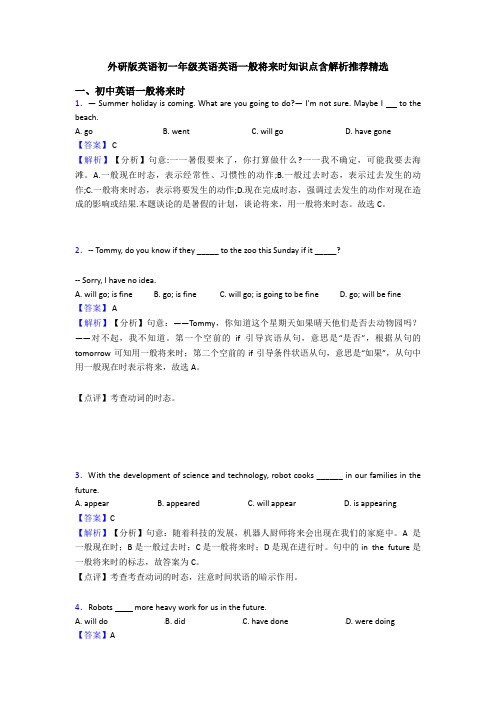
外研版英语初一年级英语英语一般将来时知识点含解析推荐精选一、初中英语一般将来时1.— Summer holiday is coming. What are you going to do?— I'm not sure. Maybe I to the beach.A. goB. wentC. will goD. have gone【答案】 C【解析】【分析】句意:一一暑假要来了,你打算做什么?一一我不确定,可能我要去海滩。
A.一般现在时态,表示经常性、习惯性的动作;B.一般过去时态,表示过去发生的动作;C.一般将来时态,表示将要发生的动作;D.现在完成时态,强调过去发生的动作对现在造成的影响或结果.本题谈论的是暑假的计划,谈论将来,用一般将来时态。
故选C。
2.-- Tommy, do you know if they _____ to the zoo this Sunday if it _____?-- Sorry, I have no idea.A. will go; is fineB. go; is fineC. will go; is going to be fineD. go; will be fine【答案】 A【解析】【分析】句意:——Tommy,你知道这个星期天如果晴天他们是否去动物园吗?——对不起,我不知道。
第一个空前的if引导宾语从句,意思是“是否”,根据从句的tomorrow可知用一般将来时;第二个空前的if引导条件状语从句,意思是“如果”,从句中用一般现在时表示将来,故选A。
【点评】考查动词的时态。
3.With the development of science and technology, robot cooks ______ in our families in the future.A. appearB. appearedC. will appearD. is appearing【答案】C【解析】【分析】句意:随着科技的发展,机器人厨师将来会出现在我们的家庭中。
外研版七年级下一般将来时讲解及练习题

Module 2短语和知识点总结:1.play后接乐器时,乐器名词前要加the,接球类、棋类名词时,不加theplaywith sb和某人玩play with a ball/water/the computer / a pen玩球/玩水/玩电脑/玩笔2.ridea bike 骑自行车ride a hose骑马driveacar/bus开车fly a kite放风筝3.take a bus/ car/taxi/train/plane 乘坐汽车/小汽车/出租车/火车/飞机take为动词,做谓语bybus/car/taxi/train/plane/bike乘汽车/小汽车/出租车/火车/飞机/ 自行车by为介词,介词短语放在句子末尾onthe bus/train/plane 乘汽车/火车/自行车on为介词,介词短语放在句子末尾in the car/taxi乘小汽车/出租车in为介词,介词短语放在句子末尾onfoot 步行介词短语放在句子末尾4.the new clubs forthisterm 这学期的新俱乐部5.would like =wantwould like to do sth=want todo sth想要做某事would liketobe=want to be想要成为...would like sth=wantsth 想要某物Would youlike some…..?(some不能变为any.) Would you liketo do…….? Yes, please.No,thanks.Yes, I’d love(like) to. I’d love to, but……6.join加入(团队、组织,人,俱乐部)joinin加入活动take part in 加入活动(侧重发挥作用)7. whatabout you?=howaboutyou?=and you? 你呢?what aboutdoingsth?=how about doing sth?做某事怎么样?8. 因为because所以so不能同时出现在一个句子中9. that’s all仅此而已,就这么多That’s all for today. 今天就讲到这里。
完整word版外研版英语七年级一般将来时

一般未来时一、定义表示未来某个时间要发生的动作,事情或存在的状态,也表示未来常常或频频发生的动作或事情。
常用的时间状语: tomorrow morning /afternoon/evening(明日早、中、晚 ),the day after tomorrow(后天 ),next year(明年 ) ,next month(下一个月 ) ,next week(下一个礼拜 ) , soon(不久 ) ,later on 过些时间, this afternoon(今日下午 ) , in+段时间( in 2020在 2020 年)............二、组成及变化一般未来常常用的两种构造:be going to+do : 表示打算、计划做某事或存心做某事。
shall/will+do :描绘未来的事情或表达对未来的展望等。
be going to will/ shall do 一定句主语 + be(am /,is,/ are) going to +主语 +will/shall+ 动词原形 +其动词原形 +其余它否认句主语 +be( am / is / are)其余主语 + will /shall+ not + 动词动词原形+原形 +其余not going to +一般疑问句Be (am / is / are)+主语will/shall+ 主语 +动词原形 +其+going to+动词原型 +其余 ?它?特别疑问句特别疑问词 (Wh-)+ 一般疑问特别疑问词 (Wh-) + 一般疑问句 ?句?三、 will 与 be going to 的差别1.be going to 表示依据主观判断未来一定发生的事情, will 表示客观大未来必然发生的事情。
E.g: I'm going to play football tomorrow afternoon.He will be twenty years old.2.be going to 含有“ 计划,准备”的意思,而 will 则没有这个意思。
一般将来时课件2021-2022学年外研版英语七年级下册

1. be going to+动词原形
(1) 表示打算、计划、愿意做的事或将来要做某事 A. What are you going to do next Sunday ?
下星期天你打算干什么 B. She is going to be a teacher . 她打算当一名教师 C. I am going to watch TV this evening. 我今晚打算看电视。
你愿意和我踢足球吗?
1.表预先的打算只用be going to+动词原形
I am going to have lunch at 12:00
2.表预测只用be going to +动词原形
Look at the clouds.It is going to rain.
瞧那些乌云,快要下雨了
will 引导的一般将来时
2. will / shall+动词原形
● shall用于第一人称, will可以通用于各种人称。 都可缩写为,ll ● 在问句中shall常用于第一人称表示建议或征求对方意见。
A. I shall write you a letter next month . 我下个月给你写信。
B. I will go to my home town next week . 我下周去老家。
jobs.
dull jobs.
Will he do dull Yes, he will.
jobs?
No, he won’t.
There will be a There won’t be Will there be a Yes, there will.
computer in it. a computer in computer in it. No, there
外研版七年级英语下册Module 4复习一般将来时 will课件(11张ppt)

• 14、Thank you very much for taking me with you on that splendid outing to London. It was the first time that I had seen the Tower or any of the other famous sights. If I'd gone alone, I couldn't have seen nearly as much, because I wouldn't have known my way about.
3
Unit 1 What are you going to do
at the weekend?
Grammar
一般将来时:be going to 详见P93
Grammar 一般将来时
1. 定义: 表达自己打算做某事、计划做某事或 者有意做某事。
2. 结构: be going to do sth 3. 时间短语:
4.—Whisengo_i_n_g_ttohpersinetcretary _____________(print) theisdgoociunmg teonhta?ve
—She _________________(print) it soon. 5. My sona'rsehgaoiirngistotoboe long. He
10、人的志向通常和他们的能力成正比例。2021/2/82021/2/82021/2/82/8/2021 4:13:15 AM 11、夫学须志也,才须学也,非学无以广才,非志无以成学。2021/2/82021/2/82021/2/8Feb-218-Feb-21 12、越是无能的人,越喜欢挑剔别人的错儿。2021/2/82021/2/82021/2/8Monday, February 08, 2021 13、志不立,天下无可成之事。2021/2/82021/2/82021/2/82021/2/82/8/2021
外研版七年级英语下册Module 4复习一般将来时 will课件(11张ppt)

Note: be动词的确定要依据主语的单复数来确定, do 永远用的是动词的原形。
Translate these phrases into English.
查收电子邮件 上钢琴课 野餐 早起 参加一个聚会 躺在床上 做回家作业 买衣服
check my email have a piano lesson have a picnic get up early go to a party stay in bed do my homework buy some clothes
3. My father is going to __B_ a plane to Wuhan tomorrow. A. go B. take C. get D. sit
4. They have never been to Beijing. They’re going there to __C__. A. go shopping B. go fishing C. go sightseeing D. go cycling
5. I’m going to __C__ some music this evening. A. listen B. see C. listen to D. hear
6. --Did you like sports? --Sure, I’m looking forward Dto ________
谢谢观赏
